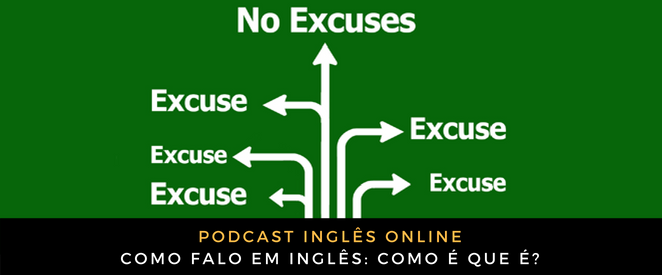Olá Ana Luiza, meu nome é Thiago, e acompanho o blog Ingles Online e ouvi seus podcasts no English Expert sobre listening. Minha dúvida é a seguinte, vc defende bastante ouvir o que já entende para um progresso na aquisição da lingua, certo? Mas esse ”entender” é a tradução do texto que vai ouvir ou sua pronúncia quando é falado ou os dois?Pergunto isso porque traduzo bem músicas que gosto, mas as vezes não consigo identificá-las ao ouvir. Me interessei muito pela sua metodologia e mal vejo a hora de pô-la em prática, mas queria esclarecer essa dúvida, fiz a mesma questão pra vc em vários outros canais, pode desconsiderar as outras onde ler primeiro. Desde já agradeço e parabenizo pela iniciativa, thank you very much! See ya!
Hello Ana !
thank you for one more podcast :D
each one better than another !
my last excuse was that I slept too , and didn’t go in my cousin’s house.
see you.
Hi Ana!
Great podcast, as always!
I believe that excuse is very clear for me now!
Thank you!!!
Bye!
So what if I told you that this podcast is about a simple word that almost every English student learns about
in their first few classes?
What do you think…
Wouldn’t be better?
Hey Ana,that’s my example: whenever I go downtown my sister asks me to buy something for her,but I always forget to buy it so when I come back home I say that they were out of the thing she wanted,for example,if she asks me to buy apple,I tell her they were out of apples or out of pens and so on lol :D that used to work a few years ago but she didin’t believes me anymore :)
Hello Ann! Good morning!
I am here again trying to put my example.
My example is about my son: “My son stays with my mother when I am not at home. Another day I went out, and when I came back home, I found the kitchen dirty, so I asked him: “__ Who did it? I let this kitchen clean and now it is dirty! Who did it?”
And he answered: “___ Excuse-me mom! It wasn’t me, it was my grandma who did it!”
What a lame excuse!
Take care Ann!
I
Hi, Ana! When my oldest daugther had 12 or 13 years old, every single time I’d ask her helping me with some homework she used to say she was sick,until the day we did go out to the pool and she got home because she was “sick”.Since then she become a super healthy girl.
Hi Ana! It’s quite common to hear about the traffic Jam.
A traffic jam as an excuse, right? I think that’s the most overused excuse ever..!!
Of course, it is. :)
Hello Anna!!! This podcast reminds a friend of mine. I lent him some money a while ago and since then he makes up the lamest excuses in order not to pay me back. I have to admit that sometimes are funny excuses. At least he is creative.
Please do!
Hello Ann! Good afternoon!
I tried once more, but I didn’t get!! :(
Thank you!
Hi Fátima!
Às vezes, o filtro de spam bloqueia um comentário – é por isso que ele não aparece imediatamente.
Mas não se preocupe em postar novamente, pois eu verifico o spam toda semana e acabo liberando os comentários que foram erroneamente capturados. Thank you :)
Hello Ann! Good evening!
My example is about my son: “My son stays with my mother when I am not at home and when I come back home and I find the kitchen dirty; I ask him: “Who did it? I let this kitchen clean, and now I find it dirty, who did it? And he always says: Excuse-me mom! It wasn’t me, it was my grandma who did it!”
Thanks Ann for more one podcast!


